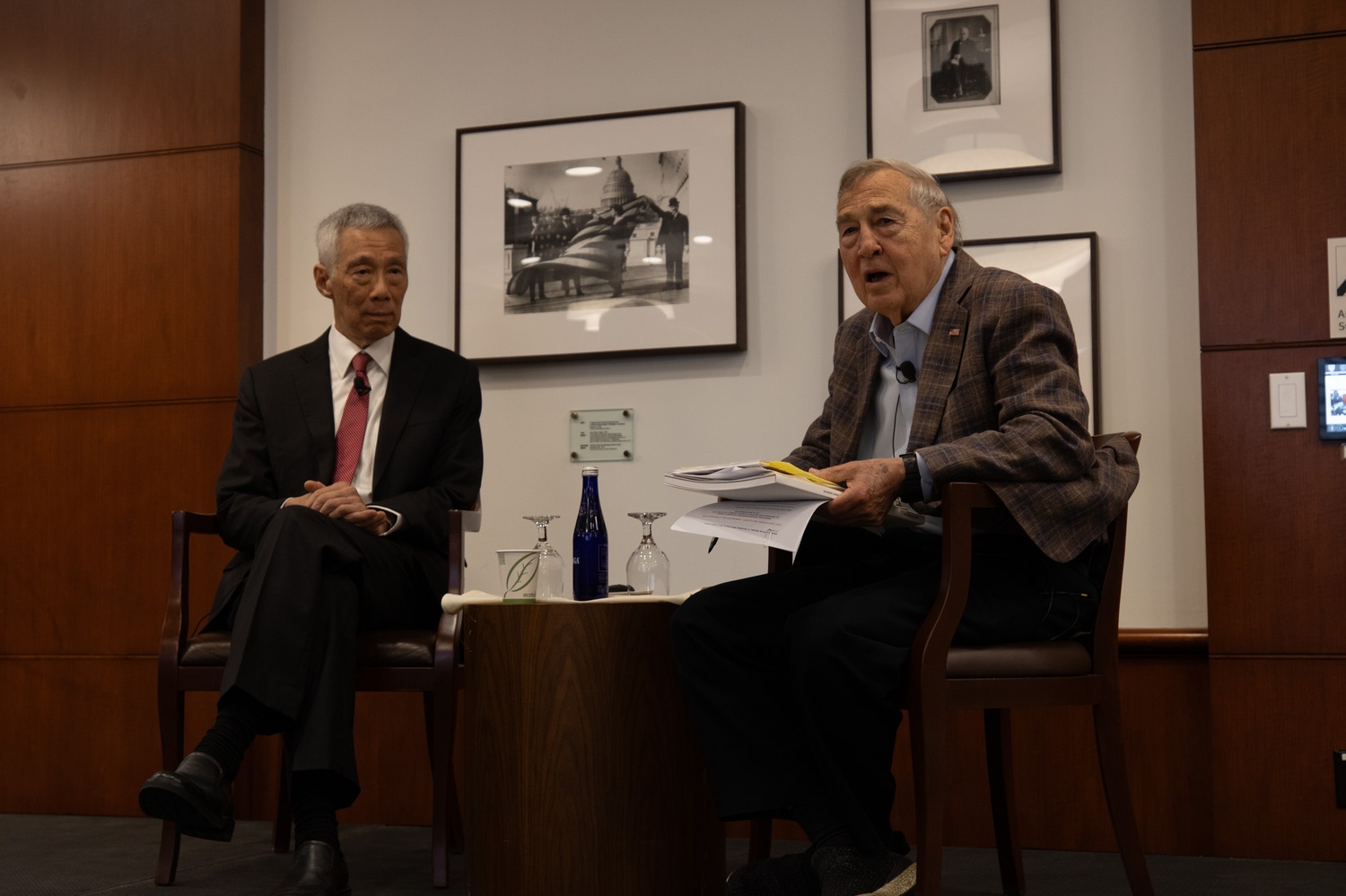
News
Harvard Medical School Cancels Student Groups’ Pro-Palestine Vigil

News
Former FTC Chair Lina Khan Urges Democrats to Rethink Federal Agency Function at IOP Forum

News
Cyanobacteria Advisory Expected To Lift Before Head of the Charles Regatta

News
After QuOffice’s Closure, Its Staff Are No Longer Confidential Resources for Students Reporting Sexual Misconduct

News
Harvard Still On Track To Reach Fossil Fuel-Neutral Status by 2026, Sustainability Report Finds
Former Singapore PM Discusses National Governance at HKS Godkin Lecture

Senior Minister of Singapore Lee Hsien Loong delivered the 2024 Godkin Lecture at the Harvard Kennedy School on Tuesday, where he discussed the principles and practices in the governance of Singapore.
The lecture, moderated by Harvard government professor Graham T. Allison ’62, focused on the establishment of Singapore’s governing foundations, the country’s management of international tensions, and its handling of the Covid-19 pandemic.
Lee, who also served as Singapore’s Prime Minister from 2004 to 2024, began the talk by highlighting how Singapore’s early grappling with colonialism, communism, and communalism formed the crux of the country’s governing standards.
“These circumstances established the founding ideals that continue to underpin our nationhood: to be independent and sovereign, to be non-communist and democratic, to be multi-racial and meritocratic, with equal opportunities for all, regardless of race, language, or religion,” Lee said.
Lee went on to describe the steps the government took for the state’s development.
“We paid close attention to building a high-quality government and high-quality institutions,” Lee said. “Most critically, we created a strong public service ethos, instilling in our offices a sense of mission to serve Singapore to the best of their ability and to make the country succeed.”
Another principle Lee identified as important to Singapore’s success was the assembly of “competent political leadership.”
“The whole system was organized on the basis of meritocracy to maximize the talent that we had,” he said. “We emphasized the rule of law and built up an independent and impartial judiciary.”
Lee also discussed Singapore’s prioritization of economic growth and development based on free market principles, but added that he sought to “build beyond the economy.”
“We also forged a national identity out of the polyglot immigrant communities that had made their home in Singapore,” Lee said.
Most critically, according to Lee, the Singaporean government is careful to never “take for granted” its people’s support.
“There is high trust in government and society. We have rising incomes and standards of living,” Lee said. “We have high-quality public services, stable politics, a strong international reputation, and a united resolute people who stand together against the odds.”
Lee credited citizens’ trust in government with Singapore’s ability to “do the right things” in response to the outbreak of the Covid-19 pandemic. According to Lee, Singapore was successful in striking an appropriate balance between closing its borders to control the spread of the virus and keeping them open to allow trade and foster economic growth.
To combat the crisis, Singapore organized a Multi-Ministry Task Force that combined governmental efforts across branches of government.
Aside from his role in implementing policy, Lee also delivered public reassurance through national broadcasts to inform Singaporean citizens of the government’s pandemic plan of action.
“I made over three years about 20 broadcasts — probably less than that — at critical moments, to reassure people that we are there. We are there for you. This is what we know. This is what the risks are. This is what we have to do together,” Lee said.
Lee ended the lecture by looking ahead to Singapore’s projected growth under the governance of Singapore’s new Prime Minister Lawrence Wong.
“I hope Singapore will continue renewing itself and rejuvenating our national project for many years to come,” he said.
Want to keep up with breaking news? Subscribe to our email newsletter.
